Hello good! The cold has begun but politics is boiling! The negotiations for the candidates for the municipal elections filled the political agenda this week, to the point of forgetting the high-sounding statements of Mayor Daniel Jadue, about whom little was known these days.
- Minister Elizalde pirquinea votes in the Chamber. The voices that told us that La Moneda would lose the table of the Chamber of Deputies had to eat their words and admitted to me that “Elizalde made the mistake this week.” On Monday we will know if the minister’s work was successful and if Senator Lagos Weber manages to stay on the Senate Finance Commission. There is pessimism in the atmosphere.
Also in this edition: the great illusion of Democratic Socialism. In the municipal campaign that is beginning, there are several voices that say that her face should be the Minister of the Interior, Carolina Tohá, because she combines the battle against crime with a leadership that does not displease the Broad Front. The problem is the surveys.
- José Antonio Kast appears in El Salvador while everyone is talking about the municipal elections. The founder of the Republican Party was visiting the megaprison of Salvadoran President Nayib Bukele this week. In Chile Vamos they told me that the same thing is going to happen to Kast as to Marco Enríquez-Ominami.
Christian Democracy integrated into the PPD/PS block for the municipal ones, he bonus track This week is an interview with socialist leader Ricardo Solari. We also said that La Moneda was informed of the results of the investigation into the murder of former Venezuelan lieutenant Ojeda and that The Chilean ambassador in Venezuela could stay in Santiago. Oh, and the reaction in the Treasury to Marcel’s appearance in the presidential polls.
- Furthermore, following the scandal over the purchase of Lexus cars for Supreme Court justices, We reviewed the Administrative Corporation of the Judicial Branch through the Lobby Law, where the vast majority of its officials have no records and the director involved in the purchase of the Lexus only records three hearings.
- Before starting, I want to invite you to share or join +Politics, our community grows more every day. If you have not joined yet, I invite you to Sign up or share this newsletter.
1
THE REALITY OF MINISTER ÁLVARO ELIZALDE IN THE CHAMBER
Five days of negotiations. Last week we titled “La Moneda a week away from losing everything in Parliament” and we explained that it was difficult for the ruling party to retain the Lower House after the Democrats ignored the administrative agreement that handed over the leadership to the Communist Party. To this scenario we add a second problem, the loss of the presidency of the Senate Finance Commission, which is still held by Senator Ricardo Lagos Weber (PPD) in protest for the failure to keep his promise. These two situations are resolved on Monday.
- Intense work by Minister Elizalde. Pro-government parliamentarians who were last Monday morning with the Minister General Secretary of the Presidency, Álvaro Elizalde, agreed that the minister was dejected, worried about the dark scenario that the press had reported over the weekend and the requests for change of the Political Committee made by several parliamentarians. But there was a change “after lunch on Monday, I saw a different Elizalde in Congress, aware that all eyes were on him,” a deputy told me. A minister of the Political Committee told me at the end of these days: “This week Elizalde made the mistake.”
Official party and opposition tied. “Last Friday (the table) was completely lost, today the scenario is different, we are tied,” deputy Eric Aedo (DC), who in our +Politics Previously I was very pessimistic. Now he says that “If the opposition wins it will be by one or two votes, it will not be by beating as we thought last week.”
- Communists would finally reach the front of the Lower House. A key vote will be that of Rubén Oyarzo (ex-PDG), who had gone with the opposition because they offered him a vice presidency, but on Thursday it was taken away from him and he spoke again with the Government. La Moneda is talking to and monitoring seven parliamentarians who can turn the election around. If everything goes well, next week Karol Cariola or Luis Cuello should assume the presidency of the Chamber. If negotiations fail, Representative Joanna Pérez (Democrats) will be the new president.
Tense atmosphere among senators. What is still in suspense is the presidency of the Finance Commission held by Senator Ricardo Lagos Weber. The failure to comply with the administrative agreement that should give the presidency of the Senate to the PPD soured the atmosphere of the commission and the parliamentarian did not make his resignation effective and decided to remain as president of said commission, where the ruling party is a minority. The only way for Lagos Weber to leave that position is for Senator Felipe Kast (Evópoli) to present a censure that the other two opposition senators on the commission, Juan Antonio Coloma (UDI) and José García Ruminot (RN), must support.
- Where is Felipe Kast? Last Monday, at the presentation of the Monetary Policy Report (IPoM), Senator Lagos Weber began the work of the commission by asking the secretary if there were pending accounts, to which the official responded that there was only one document that establishes the replacement from Senator Daniel Núñez (PC). Lagos Weber, surprised, said “is it the only account? And the censorship didn’t come?”, to go on to ask “where is Kast and the censorship of the presidency?” At that moment, Felipe Kast appeared behind Senator Gustavo Sanhueza (UDI) to explain that “we are going to present it in the next session and we do not want to contaminate the IPoM with this”, to which the PPD senator pointed out: “Why “Is he going to contaminate? If he is exercising a right… well, but he has already announced that he is going to censor me.” On Monday Senator Kast should present the censure and Lagos Weber has already warned that he is not going to resign.
Quiet-nervous in La Moneda. Managing to maintain the presidency of the table of the Chamber of Deputies will be the merit of Minister Álvaro Elizalde, this is recognized in the Palace and in Parliament. The question is what will happen if they lose the table. Lagos Weber’s situation is more complex, because his permanence as president of the Finance Commission is a response to the failure to comply with the administrative agreement of March 2022. Regarding this issue, I learned that on Wednesday there was no meeting of said commission, because Coloma and Lagos Weber were negotiating an exit to the impasse.
2
EXCITED DEMOCRATIC SOCIALISM WITH TOHÁ AS THE FACE OF THE MUNICIPALITIES
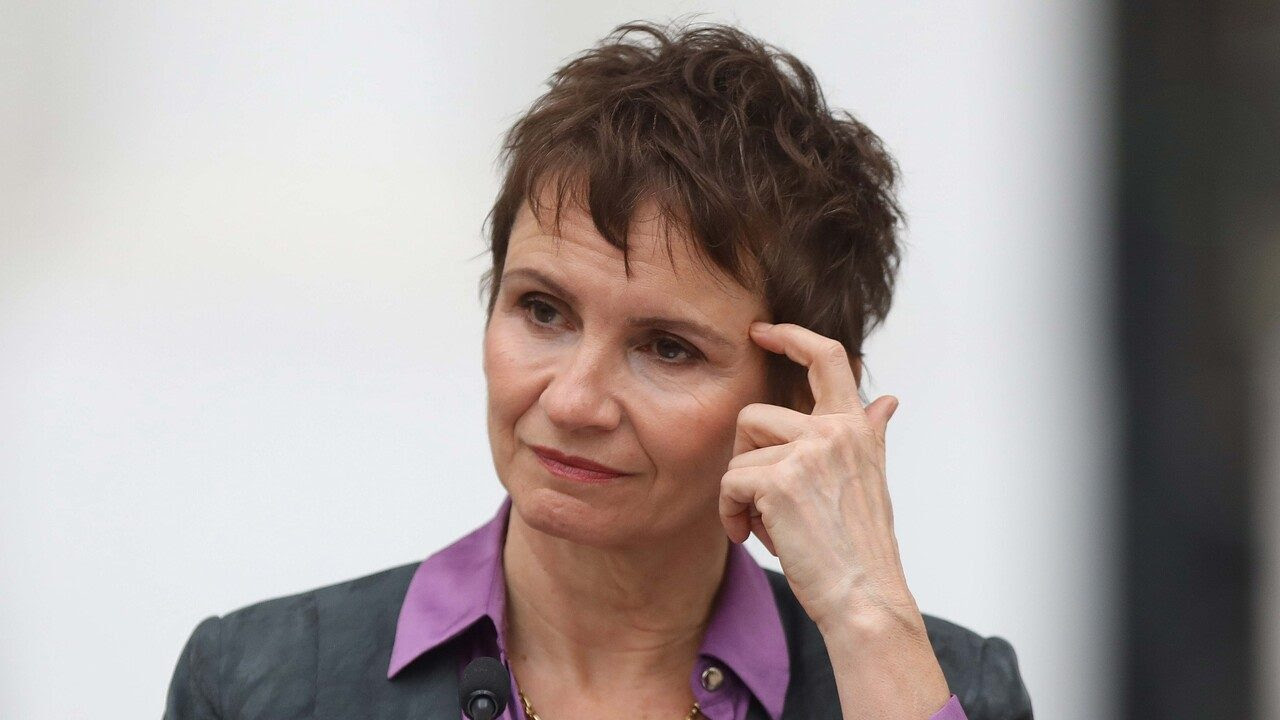
Carolina Tohá candidate. In the last seven days, two historical figures from the former Concertación came out to point out that Carolina Tohá was the best standard-bearer of the ruling party for the 2025 presidential elections.
Last Sunday, Enrique Correa confessed that “I would love for her to be a presidential candidate” and, beyond her desire, she added that “in Democratic Socialism, today, who is basically talked about is her (Tohá).” And on Monday, in The secondthe former minister and former president of the PPD, Sergio Bitar, He was more emphatic: “I greatly value the presence of Carolina Tohá and I believe that she should be the next candidate for the Presidency of Democratic Socialism and of the entire left.” An important figure in the Government confirmed to me that the matter was a topic in La Moneda.
- White smoke for the municipal agreement. In the ruling party they believe that Tohá’s name grows after the PPD/PS/DC municipal agreement, which many saw as a renewal of the former Concertación. The absence of a break and the capacity for dialogue that the ruling party leaders showed on this occasion threw the Government’s ball to the center, recognizing the importance of reaching agreements. Minister Tohá appears as a good articulator of these consensuses, because she comes from Democratic Socialism and she has been a loyal collaborator of the Government of Gabriel Boric. The problem is that the polls do not support her and her popularity is marginal compared to that of Evelyn Matthei.
Face of the security agenda. On Thursday morning, the Minister of the Interior was the first to refer to the murder of Carabineros lieutenant Emmanuel Sánchez in Quinta Normal; Then, she appeared early in the morning laying the first stone of the new building of the National Police Intelligence Headquarters of the PDI, emphasizing that this building was precisely to confront organized crime. This profile dedicated to the issue of security and the fight against crime is considered a strength by its enthusiastic promoters.
- Photo with the candidates. In the Government they believe that the image of sheriffIt could transform her into the face of the next municipal elections; However, in Democratic Socialism there are several skeptics that the candidates want to be photographed with Tohá. “That is pure wishful thinking (an illusion) that his followers have,” they told me.
Boric has the last word. A person close to the minister told me that any possibility of Carolina Tohá undertaking any career in this regard depends on President Boric allowing her to leave the cabinet before finishing the Government, which is not easy, taking into account that Tohá is the head of the political team and a fundamental piece in the security agenda being processed in Congress.
- The possibility of her being replaced by the Undersecretary of the Interior, Manuel Monsalve, is unlikely, because he would also want to leave the Government early to run for senator for the Biobío Region. “Carolina Tohá is considered a leader of Democratic Socialism that does not displease the Frente Amplio,” one of its promoters insisted to me excitedly.
3
JA KAST WATCHES THE MUNICIPAL COURSES FROM PRISON
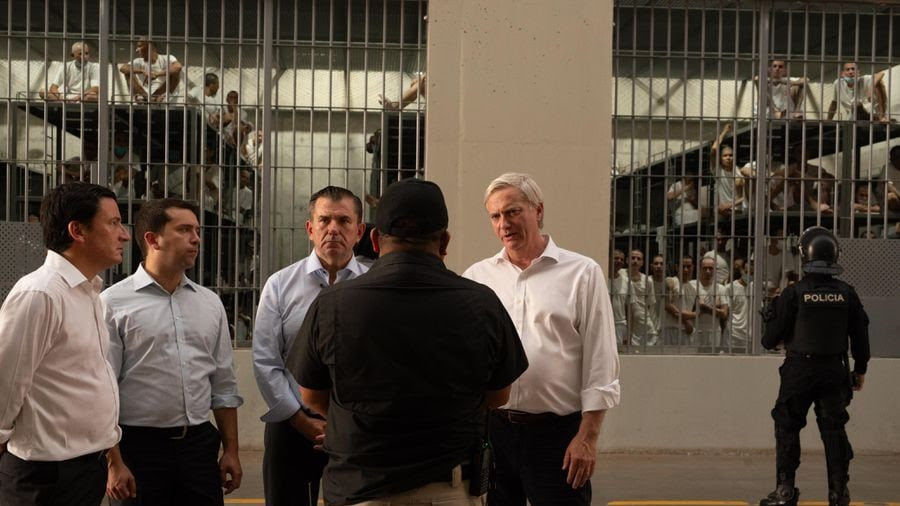
Masterful staging. While all the political parties were at the Electoral Service on Wednesday delivering the list of their primary candidates for the next municipal elections, the former presidential candidate José Antonio Kast appeared that afternoon in The second visiting the megaprison that President Nayib Bukele implemented in El Salvador. A UDI leader interpreted Kast’s trip as his reconnection with the populist right and gave me information that the republican leader is traveling to Hungary next week to see the wall that Viktor Orbán built on the border.
- There was no meeting with Bukele, but there was with ministers. The trip to the Central American country is part of what the former candidate’s circle calls the “Kast formula”, aimed at “preparing to govern.” Also present on the visit to the prison were the president of the Republican Party, Arturo Squella; Deputy Cristián Araya, who is a member of the Chamber’s Security Commission; and retired Carabineros general Enrique Bassaletti. On Thursday, images of the meeting between Kast and his team with the Minister of Justice and Security of El Salvador appeared in the press.
Difficult fourth application to La Moneda. In RN and the UDI they consider that José Antonio Kast has a difficult time on the trail, given the sustained leadership in the polls of the mayor of Providencia, Evelyn Matthei. In Chile Vamos they told me that the defeat of the Republicans in the constitutional plebiscite in December and the minor role that Kast played in Sebastián Piñera’s funeral will work against his candidacy. Those close to JA Kast acknowledged to me that they are concerned that he will suffer from the phenomenon of Marco Enríquez-Ominami, who after achieving a good result in a presidential election only lowered his vote in his subsequent nominations.
- Marcela Cubillos, an alternative. All the interviews given by the former conventional and now running for mayor of Las Condes were aimed at clarifying her intention to be a presidential candidate. Cubillos insisted that she was focused on winning the municipal election, but in the sector they point out that the former Minister of Education could be an independent alternative to José Antonio Kast. In that scenario, Kast would concentrate on affirming the party and running for the Senate for La Araucanía, they speculate on the right.
More messy right. In the configuration of the list of candidates for the municipal elections, the right had more conflictive episodes than the ruling party, such as the case of the departure of Cecilia Pérez in La Florida, the conflict with the Ossandón in Puente Alto, the absence of a candidate in Santiago , with Sebastián Sichel undefined, and the departure of Daniela Peñaloza for Marcela Cubillos in Las Condes. Kast’s bet with the trip to El Salvador was to get out of all these conflicts in the sector, to be installed on the security agenda. This week we will see the effect of his trip on the polls.
4
THREE QUESTIONS TO RICARDO SOLARI (PS)
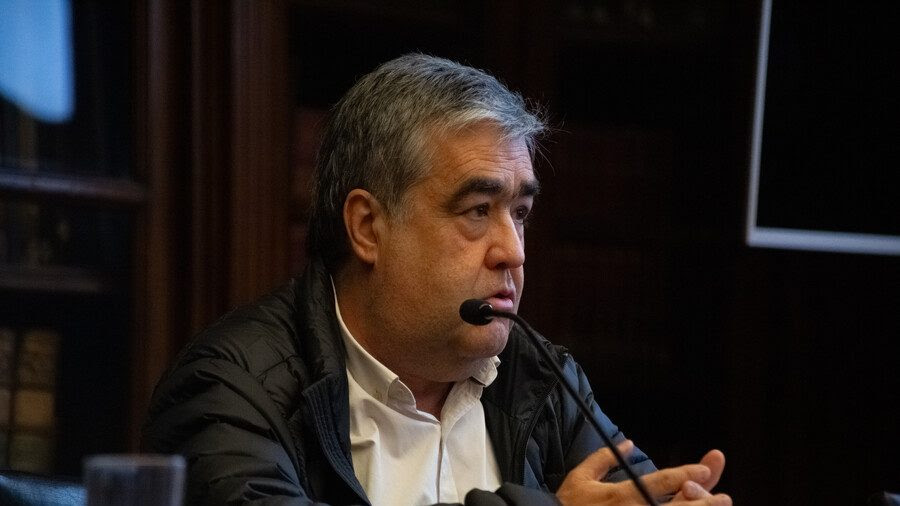
The socialist Ricardo Solari is an important articulator of the Chilean left. He began his political career as a student leader and since the return to democracy he has been undersecretary and minister of state, president of the board of directors of TVN and, more recently, he was in charge of the “Against” command for the plebiscite last December.
- In this interview, Solari explains the importance of the electoral agreement reached between the DC, PS and PPD, and addresses the possibility that this agreement will be maintained in future elections.
-How do you interpret the result achieved by the ruling party this week for the municipal elections?
-A sense of historical responsibility and pragmatism prevailed. That progressivism is grouping together is good news.
-Is it the return of the historical core PS/PPD/DC?
-It is a bet that aims to expand the electoral base of the center-left. It improves the selectivity of the adding forces and is consistent with general understanding.
-Is it feasible that this PPD/PS/DC alliance be extended in future elections?
-We currently have an alliance that commits us to the success of the Government. And we must imagine the future with a left that expands its alliances to be the majority.
5
HALLWAY CONVERSATIONS

– Ambassador Jaime Gazmuri could stay in Chile. On Thursday night, after the report of Chilevision where prosecutor Héctor Barros confirmed that the death of former Venezuelan lieutenant Ronald Ojeda was an organized political crime from Venezuela, a person close to the Minister of the Interior told me that the Executive knew of the result of the investigation: “The Government had already made a decision regarding the Ojeda case, that is why it came out so strongly that Gazmuri was called to report.”
- On Friday, the Chilean ambassador to Venezuela, Jaime Gazmuri, arrived in Santiago. The hardening of the Government’s tone began after the words of the Venezuelan Foreign Minister, Yván Gil, who denied the existence of the Aragua Train. President Boric and Minister Tohá agreed in describing Gil’s words as “an insult.”
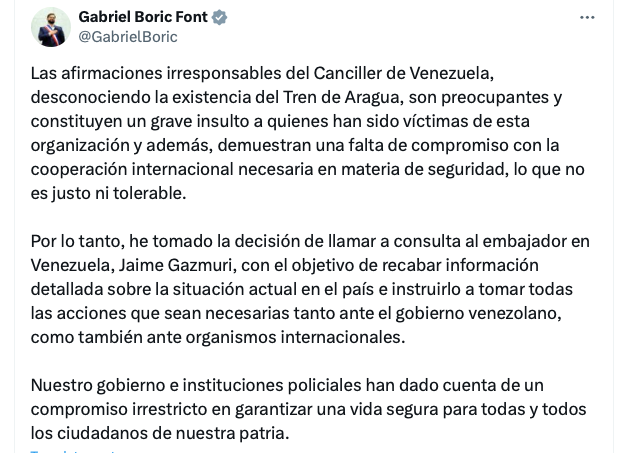
- The news that everyone was waiting for. The Government knew that it was imminent for prosecutor Barros to deliver the conclusions of his investigation, involving the Venezuelan regime.
- Two positions in the diplomatic world. The Executive told me that the result of the investigation is conclusive that it was a political operation planned from Venezuela, but that there is still no clarity about the Government’s diplomatic response.
- In the Foreign Ministry there are voices that propose giving a strong signal. That would mean leaving Ambassador Gazmuri in Chile to avoid criticism from the opposition. Other voices point out that keeping the ambassador in Chile is a bad idea at a time when there are several pending issues with Venezuela, among them, the need to extradite illegal Venezuelans involved in crimes to Caracas. At the Foreign Ministry they reminded me that “the United Kingdom did not cut diplomatic relations with Russia after the numerous cases of poisoning suffered by former Russian agents on British soil.”
– The Minister of Finance does not want to cross La Moneda. In the Cadem survey last weekend, for the first time since October 2022, the name of Minister Mario Marcel appeared in the question Could you tell me who you would like to be the next president of Chile?

- It’s not a topic. Those close to Marcel point out that nothing could be further from the minister than being a presidential candidate. The first argument to rule him out is that he is in the midst of negotiations for the fiscal pact and discussing the pension reform, so presenting him as a presidential candidate would only complicate conversations with the opposition.
- Camilo Escalona’s candidate. Last January, the general secretary of the PS was the first to mention Minister Marcel as presidential candidate, however, the party clarified that this was a departure from Escalona and is not an idea that is discussed in the community. “Escalona and his sector are small and it is not a general feeling to work for a presidential candidacy for Mario Marcel, because the minister himself does not seem interested and the polls do not favor him either,” a socialist told me.
– The silence of Daniel Jadue. The week in which it became known about the formalization of the mayor of Recoleta (set for May 29) was full of intemperate statements by Jadue against the Prosecutor’s Office, the State Defense Council, the Judiciary and several Government ministers, including , the head of the Interior, Carolina Tohá.
- The last statement. That week Jadue spoke on several radio stations, appeared on all television news programs declaring his various theories and used his YouTube program, “Sin Maquillaje,” as a platform for his complaints.
- Final point. The last speech of that week was at the Recoleta International Book Fair, where he reiterated his accusations, answered questions from the press and also spoke with attendees of the event who were clearly his followers. That was Jadue’s last public appearance.
- An obedient militant. In the PC they told me that the mayor’s silence came after party leaders warned him that, if he continued with his statements and criticisms, he would jeopardize the support of the community. From that moment on, Jadue did not appear on the scene again and, as a government official told me, “That is a characteristic of the PC, that the bases listen to their leaders.”
6
AGENDA OF THE WEEK
Monday 15: Election of the board of the Chamber of Deputies.
Monday 15: Senator Felipe Kast (Evópoli) should present the censure against the president of the Senate Finance Commission, Ricardo Lagos Weber. The initiative requires a vote in the commission, where the opposition has a majority over the ruling party.
Mars 16: Short Isapres law passes to the House Finance Commission.
Mars 16: Discussion in the Senate Government Commission of the bill that implements the October municipal elections in two days.
Wednesday 17th: Special session of the Senate to learn about the situation in Huachipato.
7
LOBBY CORNER

Members of the Administrative Corporation of the Judiciary (CAPJ) do not register hearings. As a result of the controversy generated by the Hermosilla case and its possible intervention in the process of appointing members of the Supreme Court, I looked for organizations of the Judicial Branch that are subject to the Lobby Law.
- The only institution I found for this law It is the Administrative Corporation of the Judicial Branch, but the surprise was that, reviewing the three pages of officials, the vast majority did not have recorded hearings.
- Ricardo Guzmán Sanza, director of said Corporation, has three records. It should be remembered that Guzmán Sanza resigned from his position after the scandal over the purchase of the 22 Lexus cars, but the Supreme Court rejected his resignation to open a summary and administrative investigation.
- The other two officials with the most records They are Jorge Andrés Ponce Botton, head of the Infrastructure and Maintenance Department of the CAPJ, and Mauricio Alfredo Rodríguez Avilés, head of the Information Technology Department of the same institution.
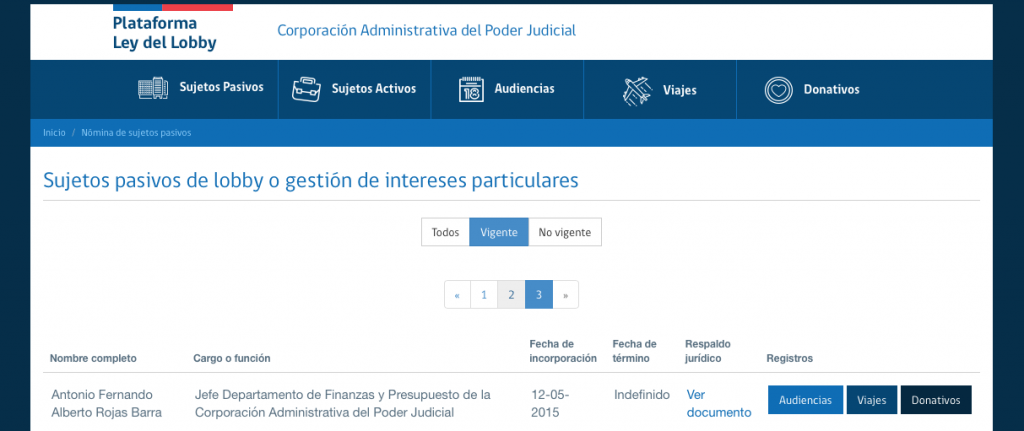
8
RECOMMENDATION OF THE WEEK: BOOK THE ANXIOUS GENERATION

Great discussion has caused The anxious generation. Why social media is causing an epidemic of mental illness among our young people (Deusto, 2024), de Jonathan Haidtwhich a week after being published was ranked number 1 on the list of The New York Times.
- This book analyzes with academic rigor the effects that the use of cell phones and social networks have on new generations. Haidt largely blames these elements for the increase in depression, anxiety, addictions, attention difficulties and even suicidal tendencies.
- The author also develops the culture of victimization and emotional fragility in young people, and relates them to parental overprotection and increased academic stress.
- This work has not been free of controversy, because critics point out that it does not provide sufficient evidence or evidence of correlation between cause and effect. They also question the fact that the economic and cultural inequalities of young people are not taken into account.
- Jonathan Haidt is an American social psychologist, academic at the New York University School of Business and author of numerous books, including The mind of the righteous (Deusto, 2019), where he analyzes the characteristics of right-wing and left-wing thought in the current context of high political polarization.
And here comes our +Politics This week. If you have any comments, questions or information that you want to share, you can write to me at jmontalva@elmostrador.cl.







